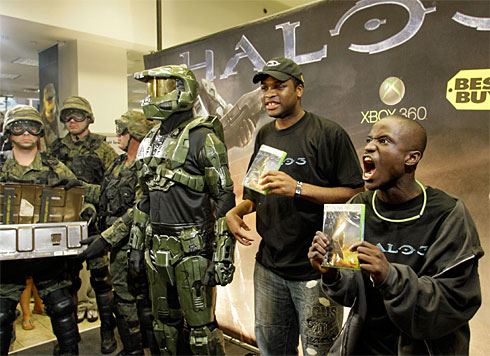Black Nerds: The Revolution
Ed. Note: Raafi’s 2007 post about new media and black identity went viral, spreading from M.I.T. to USAToday to the Canadian Broadcasting Corportation. His thoughts below are a bedrock of Desedo’s approach to engaging multicultural markets within new media.
On a late weekend night, two days before the release of the much-anticipated Microsoft video game Halo 3, a group of 8-to-10 black nerds in their late teens walks down the Bowery, their conversation animated. The leader of the pack, his Ben Wallace afro in full bloom, turns to the others, “Master Chief is… the Jack Bauer of… the Halo universe!” The pack, each member clamoring to respond in the affirmative before the others, turns into a burger joint.
The rise of the black nerd has been a blustery and uneven process characterized by large gains and deep swoons. Presaged by Clarence Gilyard Jr.’s portrayal of Theo, the computer ace who hacks into the building vault in the classic film Die Hard, the nerd who is possessed wholly of a black American masculinity is a specific character that enjoys a renaissance today even as the hip-hop world continues to project a cartoonishly grotesque opposite. The broadening media landscape, however, allows us greater access to the pulse of black America even as the mainstream media seems to be stuck on stupid infatuated with the images of black males that (used to) sell records.
For the savvy marketer, there is an opportunity in this inconsistency. If the general market advertising world has failed minority consumers it is in this most rudimentary of tasks: understanding them.
The most consistently perpetuated image of black males continues to descend from the penny short and hyper-masculine Tupac – DMX – 49 Cent strain that rather like influenza adapts to and attacks the public consciousness. That hip-hop, and its most commercially manifest gangsta contingent has been both a boon and an anchor to the media presence of black males is typified by Snoop Dogg’s career. Despite recent stints as a pitchman for AOL and Orbit gum, the D-O-double-G’s gravy train has been permanently barred from entering certain countries.
As evidenced by rapper 50 Cent’s recent record sales whimper in a grudge match against the more thematically moderate Kanye West, gangsta is on the wane. The album that did it? Graduation.

It was the night before Xmas, and all through the house, not a creature was stirring, except for the four assholes coming in the rear in standard 2 X 2 cover formation.
-from Die Hard
Theo, the black nerd at the center of Hans Gruber’s plot to steal $480m in bearer bonds in Die Hard is at once a badass and unselfconscious of his wire-framed mastery of technology. And while a film archivist might trace the revolution back to Larry B. Scott’s appearance as Lamar Latrelle in Revenge of the Nerds four years earlier, the feminized Lamar character represented no more than a farcical repudiation of the mass media’s image of blacks in that post-exploitation period. In short Lamar was weak, asexual (or gay), and like the rest of the nerds decidedly uncool — not to mention a marginal character in the films. The witty, empowered Theo, on the other hand, jumps from the screen. “You didn’t bring me along for my charming personality,” he sneers, “…though you could have.” Save for the fact that the Run-DMC-listening limo driver decks him at the end of the film, Theo’s position at the center of the story is unquestionably strong.
Steve Urkel would bring the black nerd character to the forefront of American pop culture during his reign of terror run on ABC’s Family Matters during the 1990s, but the black nerd was yet to rise to the position of misplaced yet ubiquitous appendage that he enjoys today. While the rise of counter-cultures to the mainstream is all too common, their rise within black culture, already a marginal culture with its own mores, has created unexpected hybrids. Hip-Hop producer/artist Pharrell of the Neptunes, who sometimes refers to himself as Little Skateboard P, named his quirky side band N.E.R.D. as if prophesying the coming movement… or maybe Jamal Smith? Witness: Smith, the thugged-out nerdy skateboarder.
No event underscored the rising tide quite like the release of Microsoft’s Halo 3 video game last week when Uche Nwachukwu and Darnell Jefferson were the first people in Manhattan to land copies of the coveted video game. Far be it for the mainstream media, or even the advertising world to notice, but the Uches and Darnells of the world are no longer the outliers among today’s black youth.
It is no stretch to say that the internet is alive with various honey pots of black nerdery. Andre Meadows vlogs from his gremlin-infested bedroom in Los Angeles, while the Black Nerds Network holds forth across the pond. And if dorks are allowed to join the fray, then then the online culture magazine, um, dork magazine, might also serve compelling notice that the trend itself enjoys a cresting momentum.
The proliferation of media voices and sources enabled by the internet has allowed a more nuanced and less gangster voice of young black America to emerge, untempered by market concerns and sensationalism. But you knew that. Right?
—
I can’t believe I forgot to mention Tiger Woods (yeah, I know it’s a Caddyshack reference, but still).
4/11/08 MTV post about Black Gamers on the inside.


Comments:
[…] Black Nerds: The Revolution […]
[…] Black Nerds: The Revolution […]
[…] Black Nerds […]